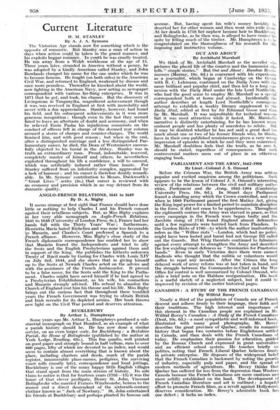Current Literature
H. M. STANLEY By A. J. A. Symons
The Victorian Age stands now for something which is the opposite of romantic. But Stanley -was a man of action in days when action could, be taken in the grand manner, and his exploits beggar romance. In youth he was cruelly treated. He ran away from a Webh workhouse at the age of 15. Three years later, stranded in America without a penny, he was adopted by a kindly American called Stanley, and John Rowlands changed his name for .the one under which he was to become famous. He fought (on both sides) in the American Civil War, and returned to ngland, weakened by disease and once more penniless. Thereafter he knocked about the world, now fighting in the American Navy, now acting as newspaper correspondent with various far-flung enterprises. It was in 1871 that he got, and took, his chance. But the discovery of Livingstone in Tanganyika, magnificent achievement though it was, was received in England at first -with incredulity and never with a due appreciation. Stanley, however, had found his field, and his subsequent achievements in it won more generous recognition; though even fo the last they seemed fated to leave an aftertaste of doubt and acrimony, and when he relieved Emin Pasha his injudicious comments on the conduct of officers left in charge of the doomed rear column aroused a storm of charges and counter-charges. The world lionized him, and with good reason ; but when in the end, after a distinguished marriage and a less distinguished Par- liamentary career, he died, the Dean of 'Westminster success- fully objected to his burial in the Abbey. Stanley was in truth an extraordinary man. Proud, indomitable, reserved, completely master of himself and others, he nevertheless exploited throughout his life a confidence, a will to succeed, which was artificially induced rather than innate. For Stanley suffered from an inferiority complex, aggravated by a lack of humour ; and his career is therefore doubly remark- able. In Mr. Symons' contribution to Messrs. Duckworth's "Great Lives" series (2s.) that career is reviewed with an economy and precision which in no way detract from its dramatic quality.










































 Previous page
Previous page